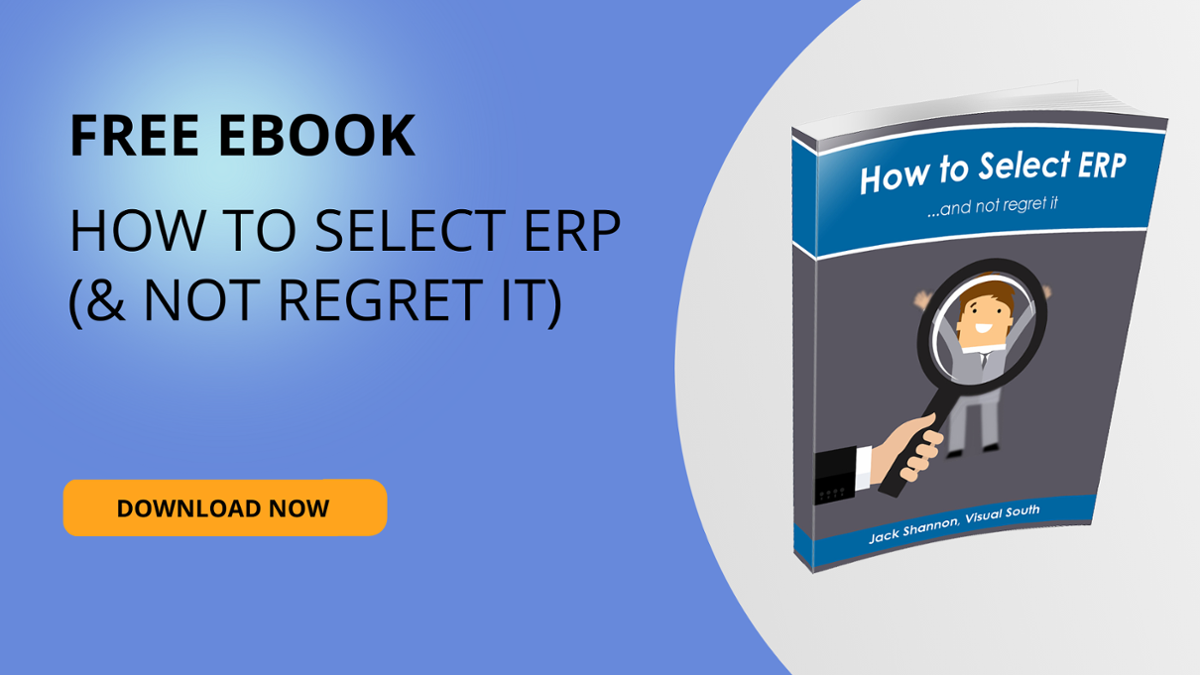You need a plan that outlines how to choose an ERP vendor and system
It may seem relatively easy to choose an ERP vendor—just pick the one that offers the best technology and customer support, right? But it’s often not that straightforward because many companies do not have a plan when evaluating vendors. I’ve been involved in enterprise application sales for over 25 years and there is little consistency on how organizations evaluate vendors like Visual South. What I can tell you is that organizations are happiest with their choice of ERP vendor when the evaluation team has a logical process in place to assess the ERP system’s functionality and the vendor’s services.Without a plan, you may not select the best system to address your specific business needs. This is an important decision because the ERP is the toolset you will use to run the business for at least the next decade. Make a good decision and your company will have the platform it needs to adapt and grow. Make a bad decision and there will be repercussions, including:
- Inability to gain operational efficiency
- Inaccurate inventory
- Varied lead times and declining customer satisfaction
- Increased admin support to manage tasks and retrieve information from the system
- Increased disorganization due to employees using spreadsheets instead of the system
- No trusted business metrics, including costing
- Devaluation of the company due to not being able to show investors and purchasers an accurate view of performance
Related: ERP Selection Process Made Simple: 6 Key Criteria
ERP vendor selection checklist – 6 actions to take
Here’s what to do in your ERP selection process before the demonstrations happen:
1. Understand your internal approval process
This step is critical to ensure your team’s efforts are not wasted and you get the system you want. The ERP evaluation project leader needs to have a full understanding of the internal steps to not only approve the ERP project, but to sign the vendor contracts. If you do not know the specific process and cannot gain approval, then it will waste a lot of time and effort, and disappoint the team due to excitement built up during the evaluation process.
2. Form an evaluation team
Build an ERP evaluation team comprised of people from varying departments. Don’t put the decision on one or two people; you can miss important needs of the business. It is also good to have evaluation team members become part of the core team during the ERP implementation. Choose employees who are team players, knowledgeable, curious and adaptable to new processes, and most importantly, dependable and get things done.
3. Build a set of requirements and data
Get a prioritized target list from each department. The evaluation team members can gather information and prioritize it. Also gather representative data that can be used during the product demonstrations. For example: bill of materials and routings, estimating and quoting tools, costing, key business metrics and reports.
In addition, meet with the leadership team to understand the company’s overall vision and goals, and how those might align with ERP requirements. The leadership team’s requirements can be significantly different than day-to-day departmental requirements. For example, a goal may be to grow the business by 10% percent year over year for the next five years. That is a lofty goal and the ERP system needs to provide the infrastructure—the tools and support—for that growth.
4. Select a short list of vendors
This is a difficult part of the ERP selection process. Make a short list of no more than five ERP providers to start with. Do some research on the internet and ask for word-of-mouth recommendations to find a handful of vendors that appear to specialize in your company’s business requirements. One simple way to find reputable vendors is to look at the information published by independent groups like Gartner, Nucleus Research, IDC, Panorama Consulting, and Technology Evaluation Centers.
Related: Infor Named #1 ERP In 3 Gartner Magic Quadrant Studies
5. Budget qualify the vendors
This step is often missed. Make sure you can afford the solution you want! Start evaluating ERP vendors with a specific budget in mind. We have worked with companies for months only to find there is not enough budget to procure the desired solution. Many times, items are put in the cart without consideration of costs and the internal time and effort needed for a successful implementation.
Related: Why Visual South is a Good Choice as an Infor Channel Partner
6. Reserve time for the discovery process
Finally, be prepared to review the information from items #1-5 above, as well as answer questions from the ERP sales team for their discovery process. However, it is the responsibility of the ERP sales team to ask the correct questions and be on point with their line of questioning. If they are not, remove them from the list. If they can’t ask thoughtful questions, they likely don’t understand how their ERP can solve your business problems.
The activities in the above ERP vendor selection checklist need to take place before the demonstrations begin. Excluding these simple, but sometimes nonobvious activities, can cause detrimental effects later in the process. Prepare and execute a well-thought-out plan and you will have success.
Related: Three Questions to Ask During an ERP Vendor Selection
Summary
Learning how to choose an ERP vendor boils down to putting a plan and team in place before beginning the selection process. It is important to understand your requirements to match the functional abilities of ERP systems on the market. Given the sometimes-complex effort, you might want to engage with our team for help and guidance. If you would like to discuss ways to have a successful manufacturing ERP evaluation, please reach out to register for a free 30-minute consulting session.
Please also take time to search our blog and check out topics such as ERP Evolution: From Selection to Post Implementation Use as there are many articles that can help you select an ERP vendor. For additional information, please visit www.visualsouth.com.








